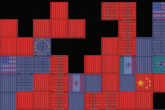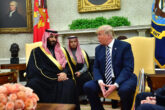August 28, 2019
How to Reform IEEPA
Over the weekend, President Trump cited a 1977 statute, the International Emergency Economic Powers Act (IEEPA), as providing the legal authority he would need to carry through on his “order” that American companies “immediately start looking for an alternative to China.” IEEPA, which serves as the legal basis for many of America’s economic sanctions programs, almost certainly gives Trump the legal power he claims. But Trump’s threat to use the statute to unilaterally remake America’s economic relationship with the world’s second-biggest economy is just the latest twist in a steady, bipartisan presidential expansion of IEEPA that makes the statute overdue for reform.
Democratic and Republican presidents have used IEEPA aggressively and innovatively since the statute was enacted. President Carter deployed IEEPA to sanction the Iranian government after the 1979 Iran hostage crisis. President Clinton used the statute, along with other legal tools, to target the assets of Latin American drug cartels in the 1990s. After the 9/11 terrorist attacks, President George W. Bush used IEEPA to cut off al-Qaeda and other terrorist groups from the international financial system. President Obama used IEEPA to ban Americans from lending money to major Russian banks and energy companies and from helping Russia developing its Arctic and shale oil resources following Russia’s invasion of Ukraine in 2014. And now, Trump has deployed the statute in his “maximum pressure” campaign against Iran and in his bid to dislodge Venezuelan strongman Nicholas Maduro from power in Caracas. IEEPA-based sanctions programs also target interference in U.S. elections, malicious cyber activities, and a growing range of global human rights abuses.
Read the full article in Lawfare.
More from CNAS
-
Game Over?
The trade wargame suggests that sustained high tariffs could create leverage and urgency to spur action toward a productive restructuring of the international trade system....
By Emily Kilcrease & Geoffrey Gertz
-
Middle East Security / Energy, Economics & Security
Trump Inks $600 Bn Deal In Saudi Arabia | Musk, Blackrock CEO Flank Trump In Gulf VisitIn today's episode of India Global, U.S. President Donald Trump secured a $600 billion commitment from Saudi Arabia on Tuesday to invest in the United States. NDTV's Gaurie Dw...
By Daniel Silverberg
-
Energy, Economics & Security / Technology & National Security
Tariffs and Tech: An Uncertain RecipeHigher tariffs could prompt American cloud companies to shift more of their capital investments abroad....
By Pablo Chavez
-
Trump Tariffs: How Will U.S. Plans Reshape the Global Economy?
Donald Trump says he's already decided the tariffs he will impose on countries that export goods to America, including the United Kingdom. Channel 4 hears from Emily Kilcrease...
By Emily Kilcrease




